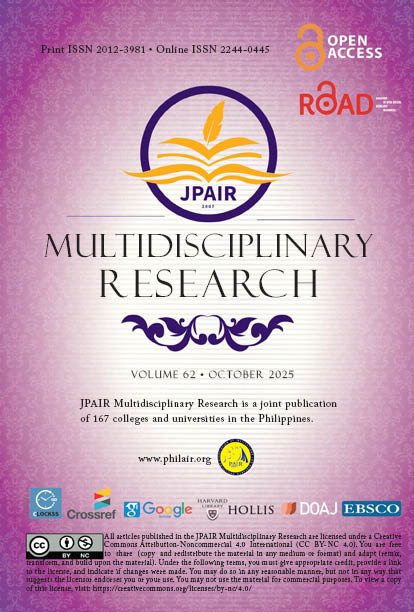The Woman-Entrepreneur: The State of Research on Entrepreneurship Education, Business Incubation, and Women in the Philippines
DOI:
https://doi.org/10.7719/jpair.v62i1.957Keywords:
Women Entrepreneurship, Innovation Centers, Entrepreneurial Skills, Female Students, Systematic Review, Educational InterventionsDisciplines:
Entrepreneurship, Education, Gender-Inclusive, Innovation, PolicyAbstract
In the Philippines, entrepreneurship education is seen as essential in boosting economic growth, generating new ideas, and starting new businesses. Despite of offering BS Entrepreneurship, mandated by CHED Memorandum Order No. 18, Series of 2017, for more than two decades, wherein the program stresses the importance of entrepreneurial skills and venture development, but gaps and challenges remains, especially when it comes to fostering creativity, maintaining institutional support, and bringing together industry collaboration. This review aims to look into the current status of entrepreneurship education in the Philippines and how it closes the economic gaps and addresses gender equality in doing business. The study observes that action-based learning, grounded on Dewey's experiential theory, Saravatsy's causation and effectuation, and Frese's action regulation theory, is a major advancement in the field of entrepreneurship education. This was built by looking at recent literature, policies, frameworks, programs, and case studies of university-based Technology Business Incubators (TBIs) and innovation centers. On the other hand, the results also showed that women are still underrepresented in the entrepreneurial landscape, specifically in scalable and innovation-driven businesses, due to systemic problems and mental blocks. The review mentions that innovation centers and TBIs have been instrumental in assisting individuals who aspire to become entrepreneurs, but transforming their programs and strategies to ensure that they are gender-responsive. It suggests that entrepreneurship education should include mentorship, soft innovation, and inclusive teaching methods to help and empower women entrepreneurs.
Downloads
References
Asia SEED. (2010). Common Curriculum for Entrepreneurship in ASEAN. https://asean.org/wp-content/uploads/2012/05/8.-Common-Curriculum-for-Entrepreneurship-in-ASEAN.pdf
Brush, C. G., De Bruin, A., & Welter, F. (2009). A gender‐aware framework for women's entrepreneurship. International Journal of Gender and entrepreneurship, 1(1), 8-24.
Carlin, B. A., Gelb, B. D., Belinne, J. K., & Ramchand, L. (2018). Bridging the gender gap in confidence. Business Horizons, 61(5), 765-774.
Downloads
Published
Issue
Section
License
Copyright (c) 2025 Maria Cristina L. Ibañez, Angelica C. Fundan, Ma. Crestia C. Bañares, Juan Miguel Reyes, Ariel D. Tulinao

This work is licensed under a Creative Commons Attribution-NonCommercial 4.0 International License.
Open Access. This article published by JPAIR Multidisciplinary Research is licensed under a Creative Commons Attribution-Noncommercial 4.0 International (CC BY-NC 4.0). You are free to share (copy and redistribute the material in any medium or format) and adapt (remix, transform, and build upon the material). Under the following terms, you must give appropriate credit, provide a link to the license, and indicate if changes were made. You may do so in any reasonable manner, but not in any way that suggests the licensor endorses you or your use. You may not use the material for commercial purposes.





















